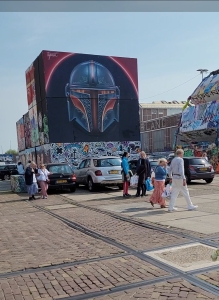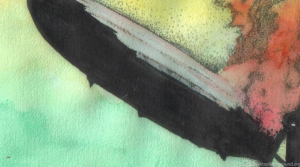Almost five years to the day after leaving Germany for the Netherlands and another professional relocation, my wife and I, together with our two cats, Katy and Gruscha, and four rather large suitcases, boarded the Eurostar at Amsterdam’s central station; we were on our way back to France.

It had been eleven years since we’d left France to pursue career opportunities in Germany and ultimately the Netherlands, and boarding the train signalled the end of an era, the end of a productive period of professional migrancy.
On the face of it, the decision to return to France may seem irrational; after all, we had left France in search of better employment prospects, social mobility, and a break from what makes France French. If rationality had anything to do with it, we would have returned to Germany, but it didn’t.
Lookin’ for soul food and a place to eat.
There was more to it than that, of course. It wasn’t a whim or complete reversal of a carefully thought-through choice made some eleven years earlier. It wasn’t, either, some subconscious yearning for more pep and spontaneity that we found lacking in the Netherlands, or even the German Gemütlichkeit, such as we had experienced in Munich.
It was the Dutch way of life itself that helped us decide. The Netherlands is itself a nice place; it’s a dependable country, efficient to a fault; it is comfortable, to the point of being monotonous; the Dutch make a point of honour of being direct, and pithy; and then there’s the food: eating is a necessity, not a social function, and the food reflects that.
We eventually came around to understanding, even assimilating, some Dutch characteristics, such as why the Dutch are frugal, pennywise and pound smart (why buy something you can’t pay for outright or frankly don’t need), qualities we hadn’t given much thought to previously, not even in Germany. We also realised that a beeline is a beeline and understood why the Dutch are direct, terse, and have no time for hogwash.
A Kasteel, but not a Chateau.
The Netherlands is a small, low-lying country, so after five years, we had experienced most, but certainly not all, of its sights and specialties—the castles and forts, the cheese, the tulips, the herring, and more—but, even if it was an interesting experience, we missed the geographical diversity of France, its culture, and of course, its food. And while there are plenty of French restaurants, so-called “bistrots”, and even food trucks in the Netherlands, what was missing was the French attitude.
It is safe to say that most, but not all, foreigners go to the Netherlands for the work, especially the highly qualified expats and economic migrants possessing the required skills, a category I corresponded with. Such foreigners may take to the Dutch culture, its food, and its language, like ducks to water; others have difficulty learning the language and live in a bubble.
One English author I followed on Twitter, Ben Coates,* shared quite enjoyable insight into life in the Netherlands, but it wasn’t for us. Neither of us felt particularly at home with the Dutch culture as we had been to the French culture, or, to a lesser degree, to the German culture. It happens.
*This author was so comfortable in the Netherlands that he eventually settled there and took (dual) Dutch nationality, but this was never an option for us.
With the end of our initial statutory five-year residency period approaching, we applied for and were granted permanent EU residency in the Netherlands, which, had we so wished, would have ultimately paved the way to naturalisation. But did we want to follow that route in a country we didn’t feel any profound or emotional attachment to? And so, after weighing the pros and cons, my wife and I decided that permanently living in the Netherlands requires the corresponding aptitude that neither of us possess.
Economic Nomads
We are nomadic; we love travelling*, and why not transform travel into an advantageous gain when the occasion presents itself?
* One of the things that drew my wife and I together was our shared interest in travel, but after understanding that economic mobility was no longer important to us, we decided it was time to put down roots and gather some moss.
And so, we boarded the Eurostar on our first leg of the journey to Paris, and as we crossed the frontier into Belgium and then into France without us even noticing, the adage “Never say never” never rang truer.
Living among France’s neighbours made the very cultural quirks we wanted a break from, despite their defaults, all the more relatable. Those very idiosyncrasies were what gave us a sense of feeling at home in France and made us feel like nomads elsewhere, living in a bubble; never looking to integrate.
Would Brexit and the loss of freedom of movement ruin our plan to return to a life in France? Only time and numerous back-and-forths with the French immigration and naturalisation service will tell.




You must be logged in to post a comment.